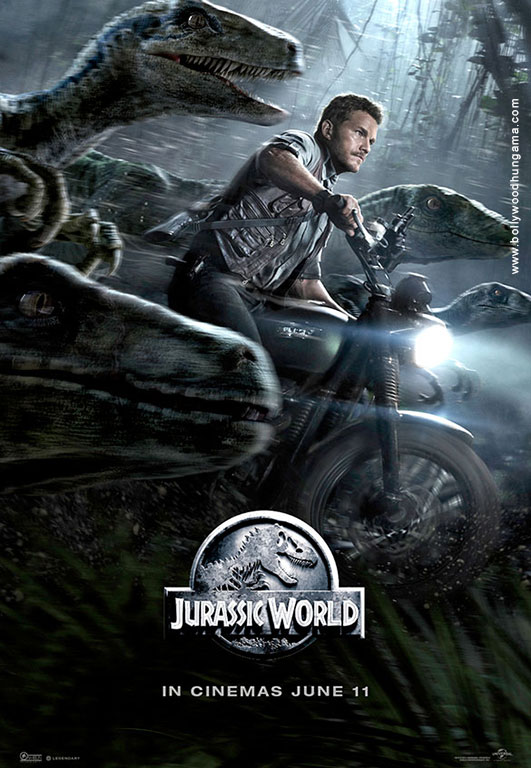Jurassic Park is now 22 years old yet still holds up thanks to well-rounded characters, an explorative script, expert direction, and a less-is-more attitude to CGI. The two sequels offered dismally diminishing returns, culminating in the shark-jumping raptor-chat of part III; so the sight of Starlord hunting with a pack of pet dinosaurs in the trailers for Jurassic World did not bode well. What did bode well was something that's been surprisingly overlooked in the series up to this point: The presence of an actual, functioning dinosaur theme park.
This instalment returns us to Isla Nublar for the first time since Steven Spielberg's groundbreaking first film. Indeed, Jurassic World unashamedly uses the original movie as its template and sole predecessor. A wise move... on paper, at least. This time our Alan and Ellie are Owen (Chris Pratt) and Claire (Bryce Dallas Howard; the kids are Gray (Ty Simpkins) and Zach (Nick Robinson); the Hammond role goes to Irrfan Khan as rich boy Masrani; and the new Nedry is Vic (Vincent D'Onofrio).
The Jurassic Park incident has been buried, and Jurassic World has been operating without incident for years. But the visitors are bored and want bigger, louder, toothier. So Henry Wu (B D Wong, the only surviving cast member from the first film) creates Indominus rex, a genetically-spliced monster which basically amounts to a T-rex with less dinky arms. Suffice to say, a breakout is imminent. The kids get lost in the wild and Owen and Claire head out to save them. Meanwhile, Vic senses an opportunity to do the Weyland-Yutani thing and seize the dinosaurs for use as weapons. Good luck with that.
Obviously Indominus rex embodies the idea that the entertainment industry constantly needs bigger 'n' louder products to keep the dollar signs rolling. It's a flash of satire but really it amounts to a, like, totally awesome new monster smashing stuff up. Relentlessly. Boringly. Jurassic World ruthlessly indulges what it seeks to satirise. It criticises corporate logic yet is just as disingenuous and bloated as any other Marvel-ised multiplex factory product. It smashes up its gift shops but has the depth of a plastic toy. It would leave a bad taste if it weren't so tasteless.
Director Colin Tevorrow's previous credit was Safety Not Guaranteed, and Jurassic World serves as a lesson in why you don't hand the reins of a big budget behemoth to an indie guy. The direction is static and lifeless. The action is adequate but rendered tame by a staggering absence of tension-building. Visceral setpieces are connected with floss. The dialogue is as thudding and clunky as a brachiosaurus with a club foot. It took four people to write this trash – I wonder if the legal wrangling over the screenplay credits was to take their names off the poster.
The characters are dull cardboard cut-outs. Pratt is stolidly sincere as the ex-Navy jock who starts and ends as a badass. Dallas Howard channels Lindsey Brigman from The Abyss as tight-ass Claire – but even Lindsey got to loosen up and take her heels off in the end. The kids... who knows? I guess they're meant to represent the indifference of youth, which as an audience experience translates as indifference as to whether they live or die. Then there's Masrani, who starts by criticising Claire for chasing the dollar and moments later gives the non-lethal order because the rampant dinosaur cost him X million bucks. Bad, bad writing.
It's not just the words that sound lame. Michael Giacchino is occasionally hailed as the new John Williams, yet the only notes of distinction in his score are those of Williams himself. There's a great moment early on when young Gray swings back the balcony doors and we see the park and that music soars... But it's a false dawn, as we're subsequently lumped with scene after lumbering scene scored with indistinct music which sounds like it was 65 minutes in the making.
Whether we can and whether we should were the Big Questions posed by author Michael Crichton. The reason the original story was so potent is because it took a distant scientific possibility and brought it intriguingly into a plausible reality. That's science fiction, folks, and that's why a single shot of a lagoon could produce such wonder and awe.
But tantalising possibility is not drama enough anymore, it seems. Today we are at a point where anything is possible with CGI so the tendency is to throw everything at the screen. And in this new World, by the final reel, with its risible monster mash showdown, you realise everything has been thrown and nothing has stuck. As a work of storytelling it's as vaporous as dino-breath on a window. As a JP sequel it's just as bad as the others. Maybe it's time to close the doors on Hammond's glorious vision. It just isn't working out.

